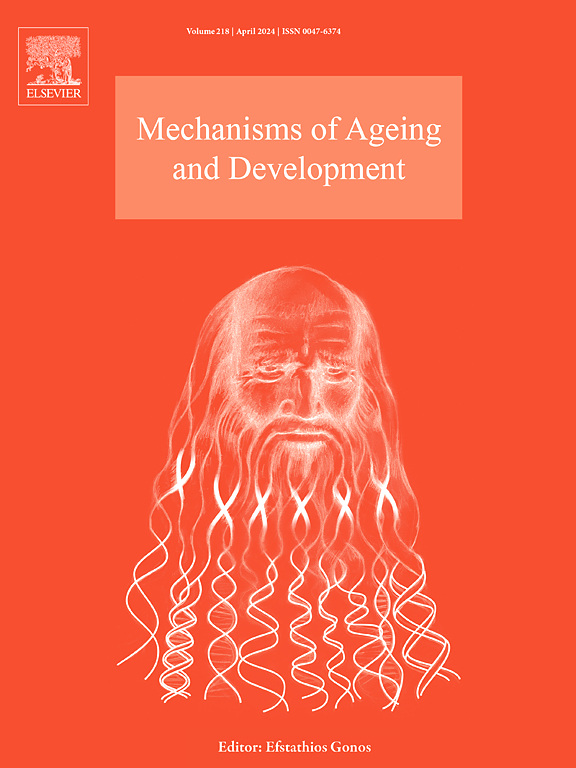线粒体在衰老过程中细胞因子和趋化因子信号传递中的作用。
IF 5.3
3区 医学
Q2 CELL BIOLOGY
引用次数: 0
摘要
衰老伴随着持续的低水平炎症,被称为 "炎症衰老",它是老年相关疾病的发病机理之一。线粒体在宿主免疫反应中发挥着多重作用,而线粒体功能障碍是衰老的一个标志,已被证明可通过调节细胞因子和趋化因子的产生来促进慢性炎症状态。在这篇综述中,我们旨在揭示这一过程的分子机制。我们描述了线粒体 DNA、线粒体 RNA、N-醛化肽、ROS、心磷脂、细胞色素 c、线粒体代谢物、钾外流和线粒体钙等线粒体信号成分在与年龄相关的免疫系统激活中的作用。此外,我们还讨论了与年龄相关的线粒体质量控制机制(包括线粒体生物生成、动态、有丝分裂和 UPRmt)的衰退对衰老时炎症状态的影响。此外,我们还重点研究了线粒体功能障碍与细胞衰老之间的动态关系,以及线粒体功能障碍在调节衰老细胞分泌促炎分子中的作用。最后,我们回顾了现有文献中有关线粒体功能障碍和炎症在特定年龄相关病症中的作用,包括神经退行性疾病(阿尔茨海默氏症、帕金森氏症和肌萎缩性脊髓侧索硬化症)、骨关节炎和肌肉疏松症。本文章由计算机程序翻译,如有差异,请以英文原文为准。
The role of mitochondria in cytokine and chemokine signalling during ageing
Ageing is accompanied by a persistent, low-level inflammation, termed “inflammageing”, which contributes to the pathogenesis of age-related diseases. Mitochondria fulfil multiple roles in host immune responses, while mitochondrial dysfunction, a hallmark of ageing, has been shown to promote chronic inflammatory states by regulating the production of cytokines and chemokines. In this review, we aim to disentangle the molecular mechanisms underlying this process. We describe the role of mitochondrial signalling components such as mitochondrial DNA, mitochondrial RNA, N-formylated peptides, ROS, cardiolipin, cytochrome c, mitochondrial metabolites, potassium efflux and mitochondrial calcium in the age-related immune system activation. Furthermore, we discuss the effect of age-related decline in mitochondrial quality control mechanisms, including mitochondrial biogenesis, dynamics, mitophagy and UPRmt, in inflammatory states upon ageing. In addition, we focus on the dynamic relationship between mitochondrial dysfunction and cellular senescence and its role in regulating the secretion of pro-inflammatory molecules by senescent cells. Finally, we review the existing literature regarding mitochondrial dysfunction and inflammation in specific age-related pathological conditions, including neurodegenerative diseases (Alzheimer’s and Parkinson’s disease, and amyotrophic lateral sclerosis), osteoarthritis and sarcopenia.
求助全文
通过发布文献求助,成功后即可免费获取论文全文。
去求助
来源期刊
CiteScore
11.10
自引率
1.90%
发文量
79
审稿时长
32 days
期刊介绍:
Mechanisms of Ageing and Development is a multidisciplinary journal aimed at revealing the molecular, biochemical and biological mechanisms that underlie the processes of aging and development in various species as well as of age-associated diseases. Emphasis is placed on investigations that delineate the contribution of macromolecular damage and cytotoxicity, genetic programs, epigenetics and genetic instability, mitochondrial function, alterations of metabolism and innovative anti-aging approaches. For all of the mentioned studies it is necessary to address the underlying mechanisms.
Mechanisms of Ageing and Development publishes original research, review and mini-review articles. The journal also publishes Special Issues that focus on emerging research areas. Special issues may include all types of articles following peered review. Proposals should be sent directly to the Editor-in-Chief.

 求助内容:
求助内容: 应助结果提醒方式:
应助结果提醒方式:


